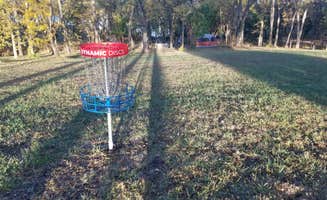Tent campsites near Corning, Iowa provide options for primitive camping in the prairie landscape typical of southwest Iowa. The region experiences hot summers with temperatures often exceeding 85°F and cold winters that can drop below 20°F. Most campgrounds in the area sit at elevations between 1,000-1,200 feet above sea level, with terrain characterized by rolling hills and small waterways rather than dense forests.
What to do
Fishing access points: Ross County Park offers multiple fishing ponds where visitors can catch bass and panfish without crowds. According to one camper, "Multiple ponds" make this "one of my favorites to go fishing and drink a few" during warmer months.
Disc golf course: The Mozingo Lake County Tent Campground features "a brand new 18 hole course right next to the camp" as noted by a recent visitor. The course is within walking distance of the tent camping area but far enough away that it doesn't create noise issues for campers.
Target shooting: Some dispersed camping areas permit recreational shooting. At Ross County Park, one reviewer mentioned that "People also go out there and shoot off guns on the upper pond," making it a potential option for target practice during a camping trip.
What campers like
Uncrowded camping experience: Tent camping areas near Corning typically maintain low visitor numbers even during peak seasons. A camper at Mozingo Lake noted the campground "was not too busy at all" on an October weekend with "maybe only 5 other groups there."
Natural site settings: Unlike developed campgrounds with mowed fields, some tent sites in the region offer more authentic woodland camping. One reviewer specifically appreciated that Mozingo Lake sites were "clean and well maintained" while still providing natural surroundings.
Minimal oversight: For those seeking true independence, Rooted Timbers and other dispersed camping areas in the region operate with minimal staff presence. This allows for self-sufficient camping without frequent ranger patrols or strict quiet hours enforcement.
What you should know
Limited amenities: Most tent campgrounds near Corning operate with minimal facilities. Ross County Park has "no services of any kind" except for "a shelter house, and trash barrel" according to a recent visitor, requiring campers to bring all necessary supplies including water.
Weather considerations: The open terrain around Corning offers limited natural wind protection at most campsites. Summer thunderstorms can develop quickly, and temperatures can fluctuate significantly between day and night, particularly in spring and fall.
Reservation policies: The majority of tent sites near Corning operate on a first-come, first-served basis rather than through reservation systems. Kokesh Co Park and other county-managed properties typically do not accept advance bookings, requiring flexible planning during busy weekends.
Tips for camping with families
Playground access: Some camping areas provide recreational facilities for children within walking distance. At Mozingo Lake, a parent noted "There are walking paths and a couple of playgrounds around the lake close enough to walk to but far enough away they won't ever be a bother."
Budget-friendly options: Most primitive camping areas near Corning charge minimal fees or are completely free. Middle River Forest Area and similar county properties offer no-cost camping options that allow families to extend trips without significant expense.
Safety considerations: Due to the remote nature of many campsites, cell service can be limited or non-existent. Families should prepare accordingly with offline maps, first aid supplies, and emergency plans, particularly when camping at more isolated locations.
Tips from RVers
Limited hookup availability: Most tent campsites near Corning lack RV-specific amenities. While RVs are technically permitted at several locations, the absence of electric, water, and sewer connections makes these sites best suited for self-contained units.
Site access challenges: Roads leading to dispersed camping areas often remain unpaved and can become difficult to navigate after rain. Larger RVs may struggle with clearance and turning radius at primitive campgrounds like Pioneer City Park, where sites were not designed with modern recreational vehicles in mind.


